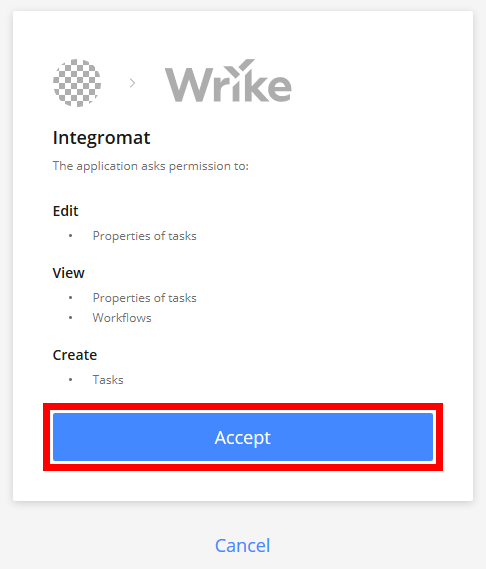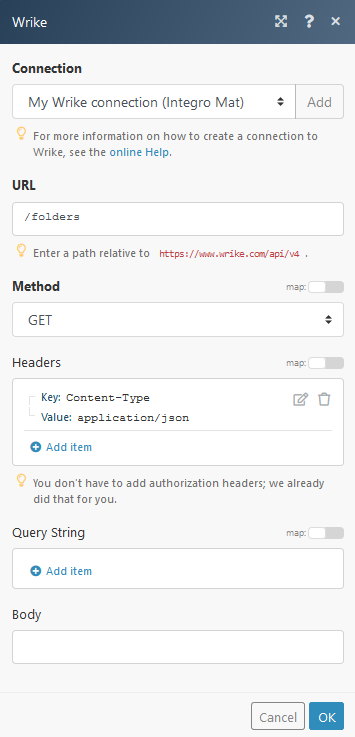Wrike
Getting Started with Wrike
The Wrike modules allow you to monitor, modify, create or delete tasks, attachments, comments, folders, projects and retrieve lists in your Wrike account.
Prerequisites
A Wrike account
In order to use Wrike with Make, it is necessary to have a Wrike account. If you do not have one, you can create a Wrike account at wrike.com.
Connecting Wrike to Make
To connect your Wrike account to Make follow the general instructions for Connecting to services.
After you click the Continue button, Make will redirect you to the Wrike website where you will be prompted to grant Make access to your account.

Confirm the dialog by clicking the Accept button.
Events
Triggers when the selected action is performed.
Webhook name | Enter the name for the webhook. E.g. |
Connection | |
Folder ID | Select the folder you want to watch for performed actions. If no folder is selected, all account folders will be monitored for the events. |
Events | Select one or more events that will trigger the module. |
Tasks
Triggers when a task is created or updated.
Required Permissions: Default, wsReadOnly, wsReadWrite
Connection | |
Folder ID | Select the folder you want to watch for performed actions. If no folder is selected, all account folders will be monitored for the events. |
Limit | Set the maximum number of tasks Make will return during one cycle. |
Searches tasks based on the specified filter.
Required Permissions: Default, wsReadOnly, wsReadWrite
Connection | |
Limit | Set the maximum number of results Make will return during one cycle. |
Title | Enter a title you want to filter the results by. |
Include subtasks | Select Yes if you want to search also in subtasks. |
Status | Enter the task status you want to filter the results by. |
Importance | Enter the task importance you want to filter the results by. |
Authors | Enter authors of the task you want to filter the results by. |
Responsibles | Enter responsible contacts for the task you want to filter the results by. |
Descendants | Select Yes if you want to search also in sub-folders. |
Sort field | Select the field you want to sort by the result. |
Sort order | Select ascending sort order or descending sort order of the results. |
Task type | Select the task type you want to filter the results by. |
Retrieves details about single or multiple tasks.
Required Permissions: Default, wsReadOnly, wsReadWrite
Connection | |
Task ID | Enter (map) the ID of the task you want to retrieve details about. |
Gets tasks from the selected folder based on the specified filter.
Required Permissions: Default, wsReadOnly, wsReadWrite
Folder ID | Select or map the folder you want to retrieve tasks from. |
Find the descriptions of the other fields in the Find Tasks section.
Creates a task in the specified folder.
Required Permissions: Default, wsReadWrite
Connection | |
Folder ID | Select a folder you want to create the task in. |
Additional Parent Projects/Folders | Select parent folders/projects for newly created task. |
Title | Enter the title of the new task. |
Description | Enter the description for the task. |
Status | Enter the task status of the new task. |
Importance | Select the importance of the task. |
Dates | Task dates. If not specified, a backlogged task is created. Backlog Duration (optional) - enter the duration in minutes [0 – 1800000] Milestone Due – enter the task due date in the format PlannedStart – enter the task start date in the format |
Work on weekends | If this option is enabled then weekends are included in the task scheduling. |
Share task with | Specify the users you want to share the new task with. |
Responsibles | Select the users that are responsible for the task. |
Supertasks | Add the task as a subtask to selected tasks. |
Followers | Add specified users as task followers. |
Follow task | Enable this option if you want to follow the task. |
Metadata | Enter the key-value metadata to the new task. |
Custom fields | Add a custom field to the task. The custom field must be already created. Follow these instructions to create a custom field. |
Custom status ID | Enter (map) the ID of the custom status. Cannot be set when the Status field is filled. |
Updates a selected task.
Required Permissions: Default, wsReadWrite
Connection | |
Task ID | Select or map the task you want to update. |
Find the descriptions of the other fields in the Create a Task section.
Deletes a selected task.
Required Permissions: Default, wsReadWrite
Connection | |
Task ID | Select or map the task you want to delete. |
Folders
Creates a folder in the selected parent folder.
Required Permissions: Default, wsReadWrite
Connection | |
Folder ID | Select a folder you want to create the new folder in. |
Title | Enter the title of the new folder. |
Description | Enter the description of the folder. |
Share task with | Specify the users you want share the new folder with. |
Metadata | Enter the key-value metadata to the new folder. |
Custom fields | Add a custom field to the folder. The custom field must be already created. Follow these instructions to create a custom field. |
Custom columns | Add custom fields associated with the folder. |
Project | Project settings in order to create a project. OwnersSelect the owners of the project. StatusSelect the project status. Start dateEnter the project start date. Format End dateEnter the project end date. Format |
Moves a folder and all sub-folders and tasks to the Recycle Bin unless they have parents outside of deletion scope.
Required Permissions: Default, wsReadWrite
Connection | |
Folder ID | Select or map the folder you want to delete. |
Timelogs
Creates a timelog record for the selected task.
Required Permissions: Default, wsReadWrite
Connection | |
Task ID | Select the task you want to track the timelog for. |
Comment | Enter the timelog record comment. |
Hours | Time to log in hours (0-24). |
Tracked Date | Enter the date you want to register time. Format |
Plain text | Retrieves Comment text as plain text, HTML otherwise. |
Category ID | Select the category of the timelog record. |
Other
Allows you to perform a custom API call.
Connection | |
URL | Enter a path relative to For the list of available endpoints, refer to the Wrike API documentation. |
Method | Select the HTTP method you want to use: GET to retrieve information for an entry. POST to create a new entry. PUT to update/replace an existing entry. PATCH to make a partial entry update. DELETE to delete an entry. |
Headers | Enter the desired request headers. You don't have to add authorization headers; we already did that for you. |
Query String | Enter the request query string. |
Body | Enter the body content for your API call. |
Search Criteria | Set the search criteria. Required when the GET method is used without ID. |
The following API call returns all folders:

Matches of the search can be found in the module Output under Bundle > Body > data.
If you stop using an instant trigger, Make will automatically start to reject new incoming messages from the service. After three unsuccessful delivery attempts, the service itself will stop sending new notifications. So if you have a webhook that you have not used for a long time, it may happen that Wrike deactivates it and you will have to create a new one.
Errors encountering with multiple scenarios running simultaneously
If you have multiple active scenarios using the same connection and running simultaneously, it may happen that some of those scenarios stop unexpectedly. The reason for that is Wrike uses a refresh-token based OAuth 2 connection. If this connection is shared by multiple scenarios and is about to expire, one of the scenarios will ask Wrike to refresh the expiring token. Wrike then returns a new access-token, but in turn also instantly invalidates the previous one, which can still be used in any other currently running scenario. The running scenario tries to access Wrike with the old access-token, and it gets refused. That's how this error occurs. But, there's an easy fix for this problem - use a unique connection for each Wrike scenario. Then one scenario won't be affected by another.